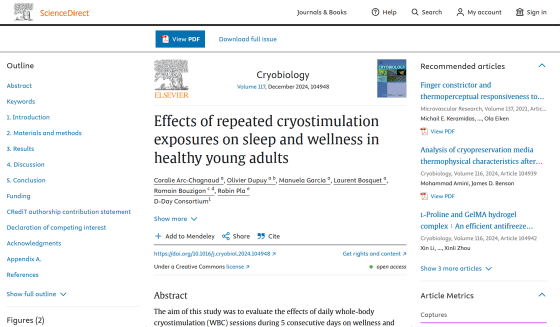Full-body cold exposure sessions may improve sleep quality

The quantity and quality of sleep has a significant impact on human life, and previous studies have shown that
Effects of repeated cryostimulation exposures on sleep and wellness in healthy young adults - ScienceDirect
https://www.sciencedirect.com/science/article/pii/S0011224024001032

Daily exposure to intense cold can improve sleep quality |
https://nouvelles.umontreal.ca/en/article/2024/11/12/daily-exposure-to-intense-cold-can-improve-sleep-quality/
Intense Cold Exposure Might Actually Help You Sleep Better, Study Shows : ScienceAlert
https://www.sciencealert.com/intense-cold-exposure-might-actually-help-you-sleep-better-study-shows
Whole-body cryotherapy is a type of cold therapy in which the entire body is cooled for several minutes in a cryochamber that is kept at extremely low temperatures. Whole-body cryotherapy is said to be effective in reducing pain caused by exercise and inflammation caused by other diseases, and is sometimes used by athletes as an alternative to ice baths .
A research team from the University of Poitiers in France recently conducted an experiment to investigate the effect of whole-body cooling therapy using a cryochamber on sleep. 'The therapeutic use of cooling dates back to ancient Greece, but the exact amount of cooling needed to provide sleep benefits is unknown,' said Olivier Dupuy , a sports scientist at the University of Poitiers.
The research team recruited 20 subjects, 9 women and 11 men, with an average age of 23, and conducted an experiment in which they underwent full-body cooling sessions for five consecutive days to evaluate their sleep. The sessions took place around 6 p.m. each day, and the subjects spent five minutes in a cryochamber cooled to -90 degrees while wearing underwear, gloves, hats, shoes, masks, etc. Below is a photo of the subjects inside the cryochamber.

After the session, the subjects avoided activities that affect sleep, such as alcohol, caffeine, and sports, and stayed until bedtime. While sleeping, the subjects were fitted with wireless brain activity sensors, wristwatch-type sleep sensors, and heart rate sensors to measure their sleep patterns and duration. In addition, the next morning they answered a questionnaire to evaluate the quality of their sleep.
The subjects then repeated the sleep quality assessment in the same way, but without the whole-body cooling session, allowing us to analyze the effect of the whole-body cooling session on sleep.
The analysis showed that on days when the participants received the whole-body cooling session, the time spent in
Additionally, subjective improvements in sleep quality and mood following the whole-body cooling sessions were more pronounced in women than in men. 'Women and men did not respond equally,' says Dupuy. 'This suggests that the amount of cooling should be adjusted based on gender, but more research is needed on this point.'

The research team concluded: 'Repeated whole-body cooling therapy adjusted sleep architecture by increasing nocturnal slow-wave sleep time and had beneficial effects on mood and anxiety. It also improved subjective sleep quality, especially in young women. Thus, regular use of whole-body cooling therapy may be beneficial for individuals experiencing sleep and well-being problems and may be applicable in a variety of contexts.'
Related Posts:
in Science, Posted by log1h_ik







